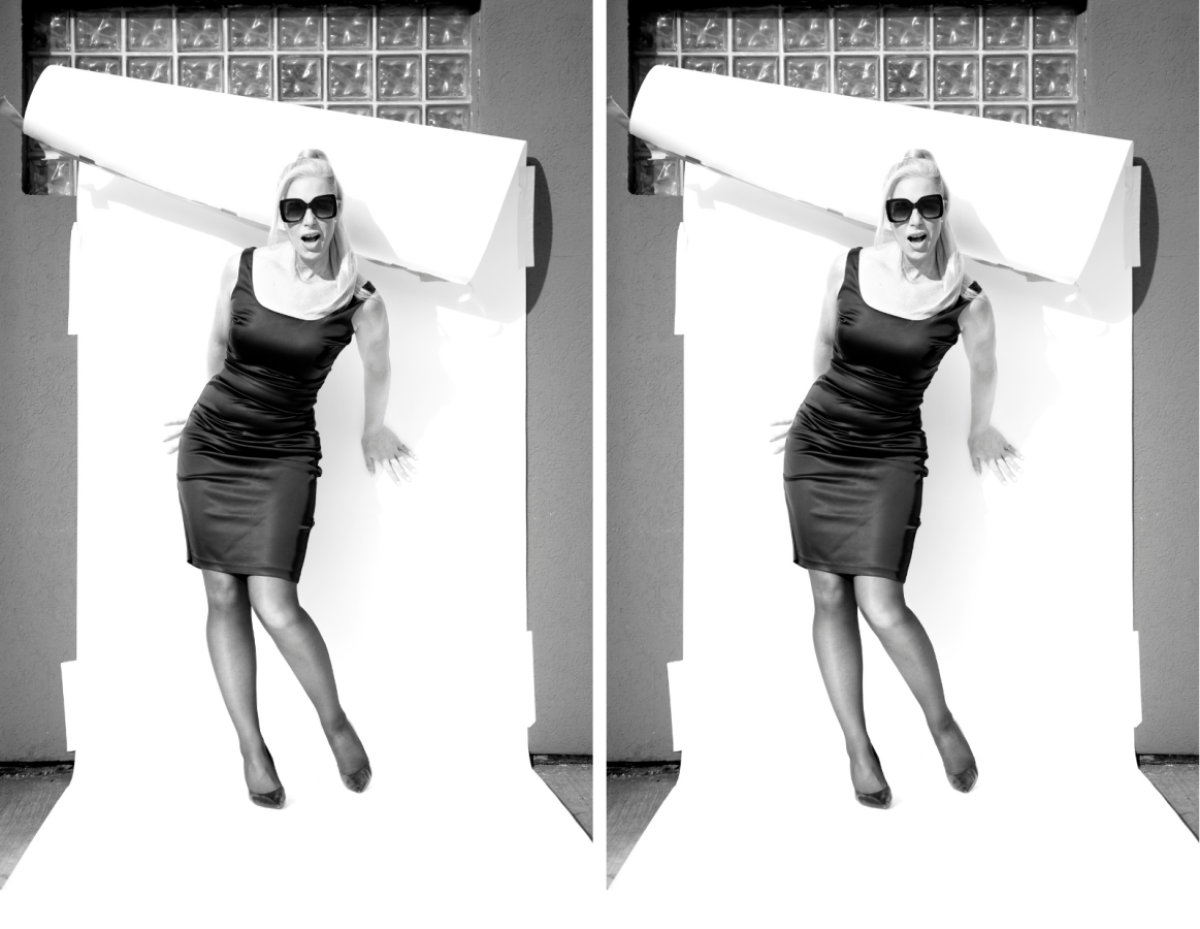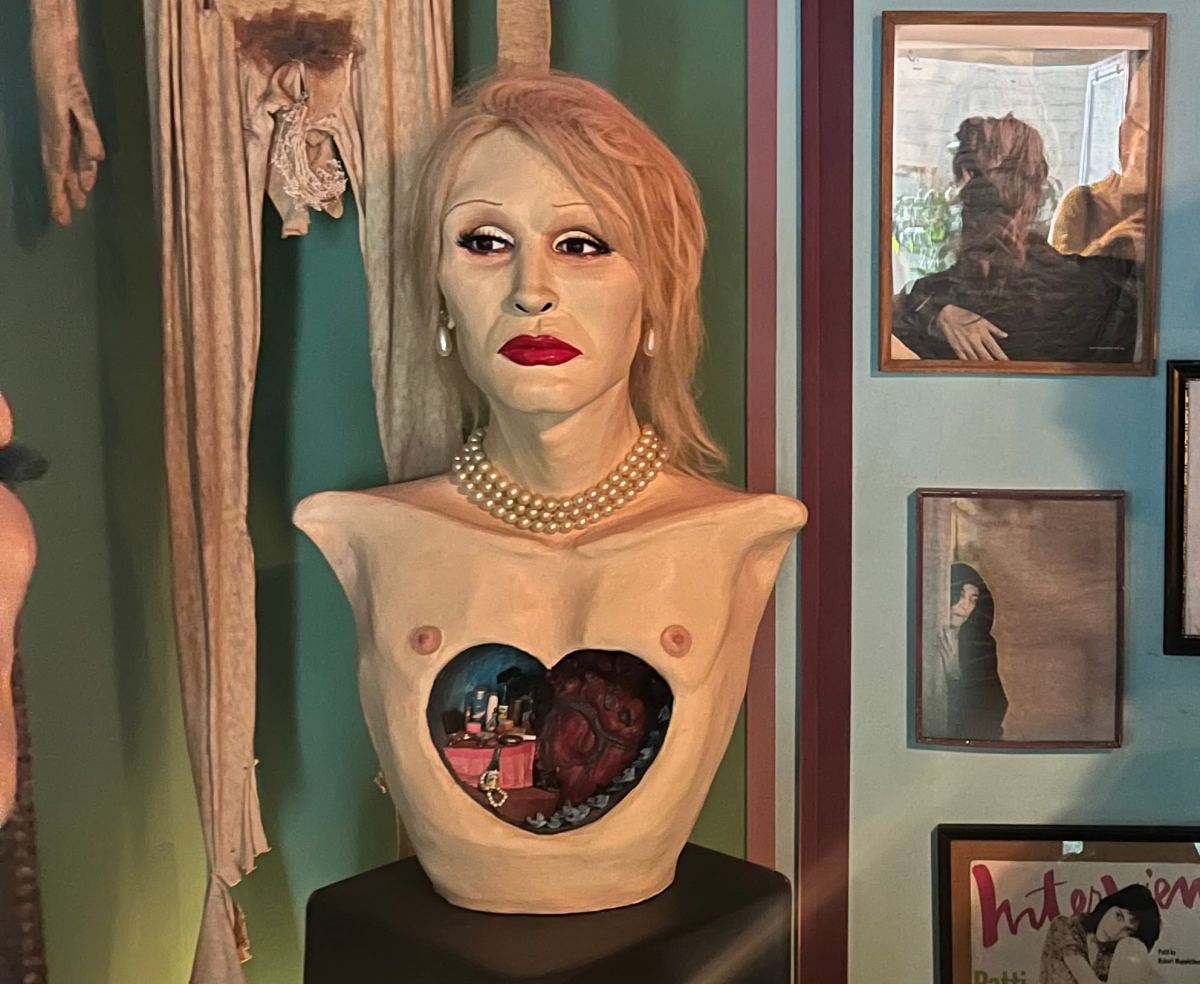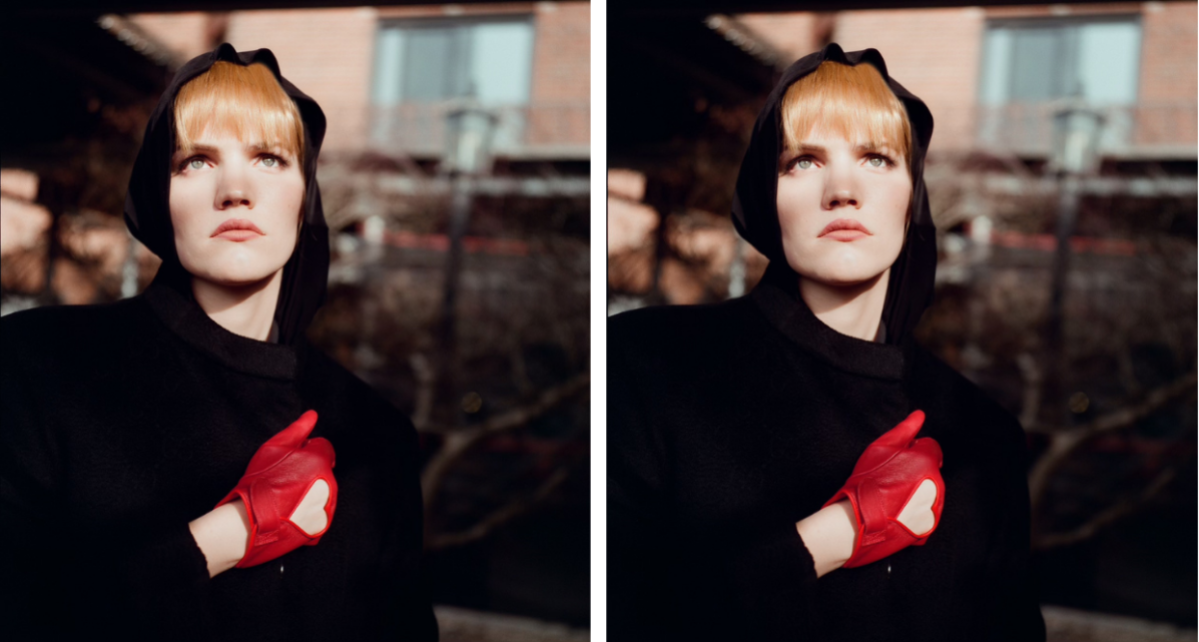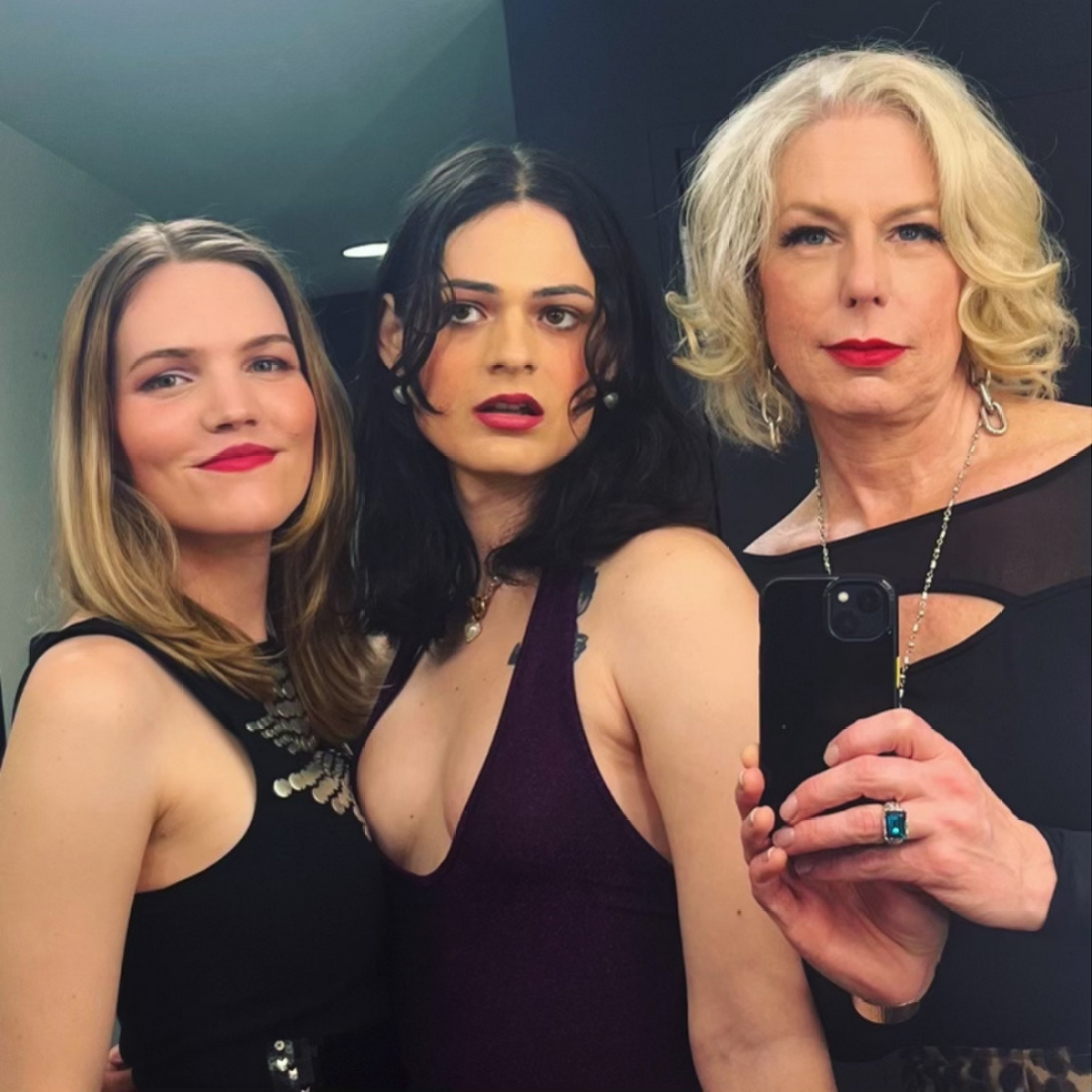“Don’t be afraid to play the wrong note,” Lisa Stephen Friday tells the guitarist. He nods and plays part of the song they just finished rehearsing. More. He plays it again a bit messier. More. Now it’s gone from pleasant to harsh. “There it is,” she says with a smile.
Meanwhile, Carmen Castillo is whispering suggestions to her co-star Murphy Taylor Smith. Or maybe Murphy is whispering suggestions to Carmen. Either way, they’re speaking to each other like bandmates rather than actors.
The entire room has an energy more akin to a rock band recording an album than musical theatre performers in a music rehearsal. Lisa is the composer and holds the most authority in the room, followed by music director Adam J. Rineer, then Murphy and Carmen, and finally recent additions guitarist Will Shishmanian and drummer Olive Faber. But the hierarchy is fluid. Everyone is experimenting. Everyone is expressing their opinions. Everyone is trans.
References bounce around the room as shorthand. A shared language. At one point, Adam suggests taking a new song in a folksier, more Americana direction. Lisa says yes, but folksy like R.E.M. Not just Americana — more Southern Rock.
After another song, Lisa says it should sound more like Lou Reed. “Even though I hate Lou Reed,” she adds. “We know,” Murphy sighs like she’s heard this opinion from Lisa a hundred times. Carmen begins singing to the tune of “Walk on the Wild Side”: And the white trans lesbians go doo do doo…
Everyone bursts into laughter.

Photo of Murphy Taylor Smith by Jan Anthonio Diaz
Doll/Girl is a musical re-telling of the life and work of trans artist Greer Lankton. But before book writer and lyricist Joseph W. Ritsch approached Lisa after seeing her one woman show Trans Am, Lisa was only vaguely familiar with Lankton.
“As soon as I started going down the wormhole of Greer, I was just obsessed,” she told me. “It was very clear to me that if Greer’s life was going to be a musical it had to have a New Wave music base, so I was very attracted to the project.”
This new obsession was shared by Murphy and Carmen. They hadn’t heard of Greer either, but once Lisa brought them on board, the connection was immediate.
“I was just getting back to New York and was obsessed with Candy and Holly and the Warhol era, so I had a lot of context for Greer’s art,” Carmen said. “It felt like, oh we’ve always been doing this. We’ve always been searching for meaning with what the previous generations did with their life and art.”
Murphy, too, found parallels with her own approach to art and life. “The sheer amount of work Greer put out into the world is so remarkable,” she said. “That was a way in, because I think of myself that way. I’m someone who wants to always be working, always be creating. That’s the only way I really understand the world and process the things happening around me.”
Despite Lankton’s relative obscurity in mainstream culture, much of her prolific work has been preserved, largely by Mattress Factory in Pittsburgh. One of her sketchbooks from September 1977 was also published last year, a copy of which was returned to Carmen from Murphy during the rehearsal I attended with the tenderness of a passed note.
A lot of the research for Doll/Girl was done by Ritsch, along with dramaturg S. Brook Corfman who is currently writing a dissertation on Lankton. But Lisa, Murphy, and Carmen all felt the hunger to do more on their own.
“Greer has done us a tremendous favor and given us a tremendous gift, because she was a prolific journaler so we literally have her words,” Lisa said. “There’s a lot of responsibility in making sure we do our due diligence in studying her journals, studying her work, and telling the story of her life and not other people’s experiences of her life.”
Murphy pointed out there’s a greater responsibility to tell a true story when much of the audience will be experiencing it for the first time. They might receive Doll/Girl as their definitive — or only — portrait of Greer Lankton.

Photo of Lisa Stephen Friday by Jan Anthonio Diaz
Before I learned about Greer’s art, I knew her image.
As a trans girl closeted even to myself, I became obsessed with the photography of Nan Goldin. I wasn’t drawn to her work solely because of the presence of Lankton and other trans and queer subjects. Goldin’s framing, her unique way with light, and her ability to make an image feel at once raw and ethereally beautiful are why she is still my first reference point when creating visual art.
But I’m sure I was also pulled in by her subjects. I’m sure I was pulled in by Greer.
Once I came out, I learned about Lankton’s own work. I saw photos of her dolls. At a time when I’d internalized cis beauty as an ideal to chase, there was something at once off-putting and inspiring in Lankton’s creations. Her dolls are beautiful. They’re also grotesque. Rather than smooth out their facial features, the sharp obstructions of a face and a body are enhanced.
To quote the opening number of Doll/Girl: That one starves herself, that one eats you alive, that one’s bruised up because this world will beat you down.

Greer Lankton’s bust of Candy Darling at Mattress Factory
It’s easy to understand Lankton’s dolls through her transness. But Lisa and the Doll/Girl team are adamant that this reduction is the same mistake made by people throughout Lankton’s life.
“They never dug deep enough to treat her mental health,” Lisa said. “They just grabbed onto her identity as a trans person and thought that was the root of all her problems.”
In Doll/Girl, transness is a given. Ritsch is genderqueer, Lisa is trans, just about everyone working on the show is trans and/or nonbinary. That aspect of Lankton’s identity is not ignored. Rather, it’s internalized to such a degree that the show can focus on Lankton’s more acute struggles, such as anorexia and drug addiction and untreated bipolar, struggles both separate and intertwined with her transness.
“That’s something a lot of cis audience members, especially, aren’t able to understand coming into it,” Murphy said. “That idea is so foreign to them that a trans person’s struggle can be about more than their gender and gender identity.” It’s what makes Doll/Girl such a powerful work of trans art. The show doesn’t ignore transness — it understands transness in the context of so many other parts of Lankton’s life.
“As soon as we started familiarizing ourselves with her work, it was just like, oh yeah I know this girl,” Carmen said. “There’s just this innate familiarity a lot of us have being creatives and being artists in New York.” Carmen noted that Lankton used to do readings at the Pyramid Club which is now the Knitting Factory. Carmen’s band just played there and her girlfriend Olive, Doll/Girl’s drummer, just had her record release there.
Murphy also found a personal connection with Lankton. At the book launch for the 1977 journal, Murphy learned that Lankton’s gender confirmation surgery was paid for by the church. “I’m the child of a priest and very much grew up in the church,” Murphy shared. “When I had gender confirmation surgery, the church’s health insurance also paid for it. It’s this silly connection, but I started crying when I heard it. The oddness of that. This woman had so much love in her life and all these people who really cared about her. But she was so mistreated that love didn’t make up for it.”
This might be the most startling aspect of Doll/Girl. Trans stories, especially ones that take place in the 80s and 90s, don’t usually feature supportive parents. This one does. During one number, two of the dolls embody Lankton’s parents, sending caring letters to their daughter — who they acknowledge as their daughter. It’s an experience even more relevant to today. While a supportive family can save a trans person’s life, they can’t change our society as a whole. Sometimes support from those either biological or chosen still isn’t enough.
“We have access to her at 19 writing about how she saw the world and she saw it with such frightening clarity,” Murphy said. “There’s a punishment in that. Especially when other people can’t see it. When you’re the Cassandra trying to convince everyone of what’s happening. She carried that burden.”

Photo of Murphy Taylor Smith by Jan Anthonio Diaz
The dolls of Doll/Girl met exactly how you’d expect: off-broadway theatre, the Transparent Musical, and John Cameron Mitchell.
Carmen was making her off-broadway debut in a show at 59e59 while Murphy and her twin sister had a showcase at 54 Below. They saw each other’s performances and have been friends ever since. “We just kind of share a brain in rooms like these,” Carmen told me. “We’re very focused, very driven, and very insistent on getting everything super right.”
Murphy was cast in the Transparent Musical and during one of their workshops in September 2022, Lisa came on to play Maura. “We hadn’t really heard each other sing yet and there was some insane note that wouldn’t be written for anyone to sing normally,” Murphy said. “Lisa was like, ‘Should I just go for it?’ And then she opened her mouth and it was one of those moments where the whole room couldn’t believe the instrument this woman had.”
It wasn’t just Lisa’s talent, but how she used her talent that resonated with Murphy. “I’d never heard a trans woman sing that way before,” she continued. “In musical theatre, it’s usually about imitating cis women’s voices. The way I’ve gotten roles has been imitating that quality of softness and lightness. But Lisa is a rockstar powerhouse vocalist. It’s undeniable. She uses tones that are typically associated with masculinity but take on this incendiary, otherworldly quality when she sings them. I was immediately like, I’ll do whatever this woman asks, I’ll follow her to the ends of the earth.”
Carmen and Lisa started following each other on Instagram through Murphy. And then they met while Carmen was barbacking at a gay bar in Hell’s Kitchen called Red Eye. There was a Jayne County tribute show and Lisa sang a duet with her friend John Cameron Mitchell. “I was giving them bottle service,” Carmen laughed.
Even before meeting in person, Lisa had been drawn to Carmen’s “rock n’ roll world.” As theatre at large has grown more conservative in the wake of Covid, Carmen has turned toward music. “I bring a lot of my experience performing in clubs and singing actual post-punk music,” Carmen said. “Along with a certain amount of theatre training, so I can do it sustainably.” A perfect match for Lisa who told me, “I’m a musical theatre performer. But I’ve never written musical theatre. I write very straightforward rock n’roll, even punk.”
When watching Lisa’s one-woman show, Carmen realized their connection went beyond music taste. “My egg cracked when I was on the Once tour and Lisa’s cracked while on tour with The Buddy Holly Story,” Carmen said. When I didn’t give this the proper reaction, she added excitedly, “They’re both actor/musician shows!”
Lisa didn’t continue on with the Transparent Musical and she and Murphy briefly lost touch. But when Murphy was working on a project with John Cameron Mitchell, the two attended Lisa’s 50th birthday concert together. That was when Murphy first heard a song from Doll/Girl.
Even without knowing of Greer, Murphy knew this was a project she wanted to join. “Musical theatre is often focused on theatrical storytelling, so writing music that’s affecting, powerful, and beautiful gets left to the side,” she said. “But I heard that song and I was like, that’s a good fucking song, that’s an amazing song.”
“When I’m writing a song, I try to imagine Greer,” Lisa said. “Whether she’s working on a doll or walking down the street, I want the music to feel like something in her cassette walkman.”
“Lisa is so dialed into the music,” Carmen gushed. “She’s one of my favorite songwriters.”

Murphy Taylor Smith, Carmen Castillo, and Lisa Stephen Friday
As someone who has worked on many film and theatre projects as the only trans person or one of a few, the transness of this creative space stood out to me. But, like with Greer’s life, Murphy and Carmen were quick to correct me that the transness of the room is what it makes it unique.
“I’m often in trans rooms these days,” Murphy said. “The American theatre as a whole, especially musical theatre, has not really opened its doors to trans women yet. There’s an unwillingness to be flexible and to just see us as women quite frankly. So by necessity, I am working with a lot of other trans people.”
“It’s a connection beyond transness,” Carmen said of the Doll/Girl creatives. “I like to stress that it’s not necessarily a difference of trans vs. cis. There are just people who operate on your same wavelength and people who don’t.”
For Murphy, it’s as much about the kind of room Lisa creates. It’s a place of collaboration, sometimes even growing combative. “The way you’re often meant to feel in these rooms is you’re an actor, you’re a piece, you’re clay to be molded, paint to be used, you’re not going to be an artistic voice, you’re part of a machine,” Murphy said. “But you can’t interact with a show like this, with a part like this, from that perspective. It puts you in a place of submission and this isn’t a role of submission. It’s been huge for me as a performer and an artist and a human being to be encouraged to step up and take ownership.”
Murphy, Carmen, and Lisa all talk about the theatre world with the love and frustration of grown kids disappointed with an out of touch parent. “There’s a lot of pristineness on the American stage right now, and I think that’s true in film too,” Murphy said. “There’s a lot of cleanliness in art. But I don’t think that actually sets us up to have people with real artistic authoritative stances on what they’re saying or what they’re doing. It just encourages you to go along with the expected. But not this piece. Lisa has always said to me, you are the rockstar and that’s the only way to attack the role.”
“Theatre can really suck,” Carmen said. “I mean, I love it. But it sucks if you don’t have your heart and soul in it and dig deep. It’s why I’m so excited to have a project like Doll/Girl because I feel fully comfortable and safe pouring the entirety of myself into it.”
“This is probably the first time they’re really being given musical theatre material written explicitly for them,” Lisa said of Murphy and Carmen. “I see it empowering the two of them to whole new levels. They’re brilliant actresses and get on stage with such confidence. It’s really exciting to watch.”
“When I came back to acting after transitioning, I made myself extremely small and extremely moldable in order to work,” Murphy said. “I was auditioning mostly for cis roles and it’s kind of a devastating thing to do to a trans girl a year out of the closet, because it tells you over and over that you need to be a cis woman. Working with Lisa has taught me to embrace what I’m bringing as an artist and a human being.”
“We’re not trying to be cis women, we’re just women. And if that means I can’t be in Six on Broadway, then, well, I’ll recover.”

Photo of Doll/Girl at Joe’s Pub Katie Simmons-Barth
For Lisa, the transness of her collaborators feels more noteworthy. She talked about making a show about a trans woman who was about twenty years older than her with two trans women who are about twenty years younger.
“It’s given me this very inside view of our progress as trans women,” Lisa said. “It’s helping me to really find joy in my work telling trans stories. Yes, it’s my work and I need it to succeed so I can pay my bills. But it’s also a building of a community. I see this community that’s exploding and we’re becoming really powerful.”
Murphy and Carmen also feel the weight of playing these prominent women from trans history — Murphy as Greer and Carmen as Candy Darling… or at least Greer’s doll version of Candy. One of the show’s best moments is, to quote Carmen, “a sapphic fever dream” between Greer and Candy. “It’s that classic doll politics of do I want to be with her or do I want to be her.”
The more Carmen has researched Candy, the more protective she feels of her as a character. “She was a lot more self-aware than people give her credit for and a lot funnier,” Carmen said. But, Carmen acknowledges, the real Candy still would’ve hated this gay portrayal of her.

Photo of Doll/Girl at Joe’s Pub by Katie Simmons-Barth
Murphy has also found reverence and distance from Lankton as a real person. “Being careful with your art and being incredibly delicate is the anathema of Greer’s artistic ethos. You have to allow for the messiness,” Murphy said. “We never want this to be a saccharine treatment of her story. It wouldn’t be honoring Greer to be like, oh my God what are people who knew her going to think? At a certain point, I have to just accept this is my interpretation and I’m doing it from a place where I love her and her work.”
It’s an impressive approach considering some of Lankton’s family and Nan Goldin herself were at the first Joe’s Pub performance. It also feels like something only possible due to the space Lisa has helped shape, along with Ritsch and director Ty Defoe (yes, also trans).
“It’s just more fruitful creating with trans people who are open and excited and embrace that shared language of fighting as love and fighting as the work,” Murphy said. “It can take you to places you can’t get to when you’re too focused on taking care without taking action.”
“Especially for Lisa, Carmen, and I playing these roles, we all love each other so much, but we are also fierce about how we want this story to be told. That’s exciting. You only get that passion when you’re telling a story that matters and working with people who care about getting it right.”
Their second performance at Joe’s Pub is just a couple of weeks away, and then the future of the show is uncertain. “If I’m going to tell trans stories, it’s not to explain my existence or justify my existence,” Lisa said. “I’m telling the story for trans people. That is who it is for, that is who my work is for.” But to get to the next stage — literally and metaphorically — it’s likely cis people will have to be convinced of the show’s worth.
“I wouldn’t mind some cis people being involved eventually,” Carmen said. “Maybe in the giving-us-money roles.”
Sometimes work is made with such specificity and such skill, the import is undeniable. By remaining true to their perspectives and collaborations, the team behind Doll/Girl may have created that rare piece of idiosyncratic trans art that will break through. I hope so, anyway.
During the music rehearsal, one of the songs ended with Lisa’s notes for mess taken to heart, everyone pushing their instruments and vocal instruments to a cacophonous harmony.
“That was unbearable,” Lisa said with a laugh.
“That was awesome,” Carmen corrected.
Doll/Girl will be at Joe’s Pub on June 3.


